Trona Pinnacles
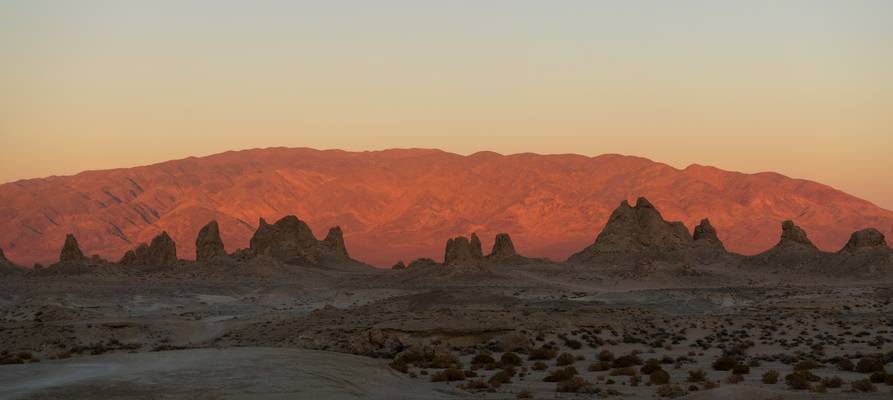
1
- Charles R. Swindoll.
| facebook | 500px | ferpectshotz | buy |
Todays shot is of the wonderful pinnacle tufas of Trona Pinnacles at sunset. This photo was taken just when we reached the location as the light on the hills was just perfect. I originally didn’t plan on a sunset shoot that day and was hoping to just scout for a suitable milky way photo spot. But once I saw the light that was happening in front of us, I forgot all restraint and ran out with my camera and tripod for a nice sunset shot. What I liked about this composition was that the tufa pinnacles were in the shadows while the hills in the background were lit perfectly by the setting sun giving the whole scenes a nice depth.
When I started photography, I had lots of trouble correctly exposing images with dark shadows and bright sunlight. I used to rely heavily on my ND grad filters to balance the light and it was not unusual for me to take images with all three of my ND grad filters in use. This was a habit from my film days when recovering clipped dark tones was not an easy task. But as I spend more time with DSLR cameras, I learned that they are far more forgiving on recovering dark parts than recovering clipped highlights. So now when I meter a scene, I make sure that I am exposing for the brightest part of the image and then use the live histogram along with the exposure compensation dial to avoid any clipping. I would also like to add that the D800 I had earlier didn’t accurately show histograms but the D850 has a perfectly accurate histogram.
So this image which would have otherwise required at least a 3 stop nd grad filter is made without any filters by just exposing for the strengths of the modern digital sensor.
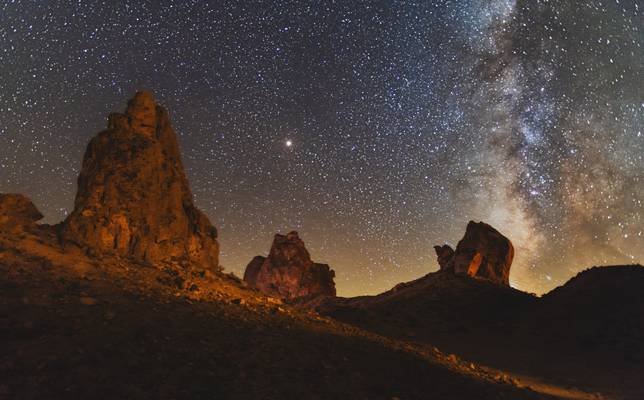
0
- Tahereh Mafi.
| facebook | 500px | ferpectshotz |
Here is another milky way shot from the Trona Pinnacles outing. This shot was taken after I took the main composition of the pinnacles that I wanted. Trona Pinnacles is such an amazing location fro photography that there are about a million possible compositions here and is very easy to get overwhelmed. I have noticed that usually when I am at a location like this, I change my compositions a bit too much in trying to get everything I can, I sometimes get technical details wrong and discard the images during post-processing.
This shot is an example of the above scenario, I moved on to this spot because I knew that the composition would be good with a strong diagonal slope across the frame. But moving your camera and tripod during night photography is not an easy thing. You must move safely, especially in the desert. I messed up my focus settings while I moved and didn’t notice until later that my shots were terribly out of focus. So, in the dark, I had to set the focus again and continue with the shoot. I usually take about 10-20 shots and then stack them later in photoshop to remove noise (Ian Norman of Lonelyspeck.com has published an excellent article on how to do this in youtube). The problem is, to achieve this you need to take shots with very little intervals in between as otherwise, the rotation of the earth will screw up the stacking of the image. Unfortunately, I forgot those aspects and messed this photo up by panicking about focus. So this shot is just a stack of about 5 images, also I still didn’t nail the focus perfectly. But I love the composition enough to post this image.
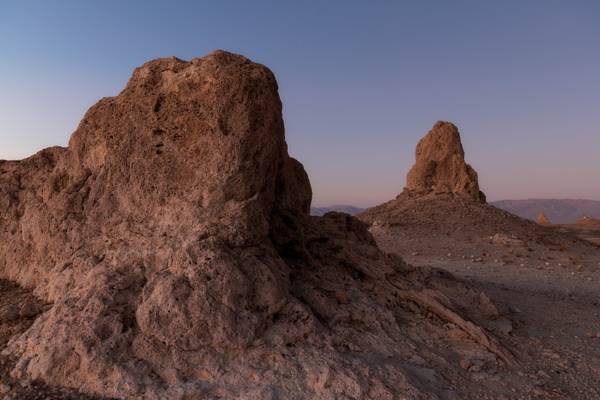
0
- Charles Kettering.
| facebook | 500px | ferpectshotz |
Even though I am a resident of Socal for five plus years now, only recently I heard about unusual geological feature in the California Desert National Conservation Area called the Tronna Pinnacles. The unusual landscape consists of more than 500 tufa spires (porous rock formed as a deposit when springs interact with other bodies of water), some as high as 140 feet (43 m), rising from the bed of the Searles Lake (dry) basin. The pinnacles vary in size and shape from short and squat to tall and thin and are composed primarily of calcium carbonate (tufa). They now sit isolated and slowly crumbling away near the south end of the valley, surrounded by many square miles of flat, dried mud and with stark mountain ranges at either side (Source: Wikipedia).
These formations are only about 3 hours from our home and required some offroad driving to get to the pinnacles (there was a prius at the parking lot, so its not that bad). One of the outstanding features about the pinnacles is that the sky here gets close to total darkness at night, meaning you get a stunning view of the milky way and the galactic core from this spot. So, when my wife commented that she fancies a drive this weekend, I played it cool and drove straight to the wonderful geological formations. We eached just before sunset and had a chance to explore the area with some amazing golden hour light. This is an upclose shot of some of the pinnacle formations just after sunset.
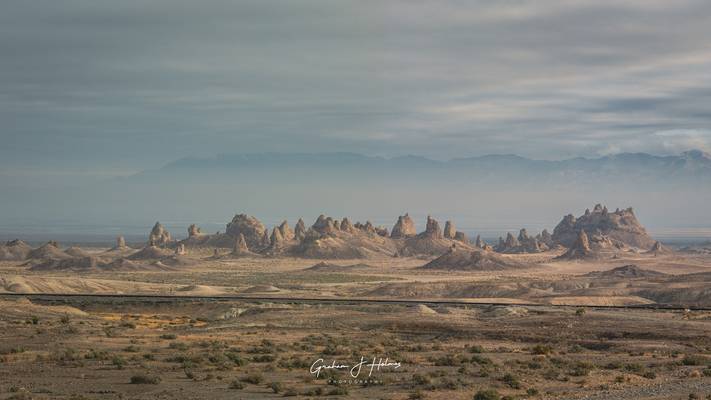
0
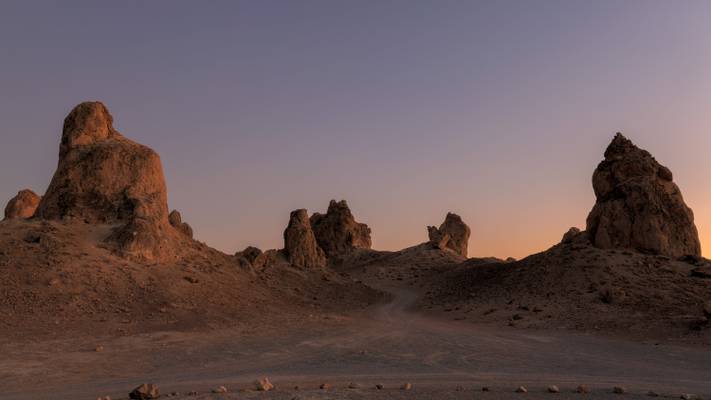
0
- George Halas.
| facebook | 500px | ferpectshotz |
Trona Pinnacles is a location that is often mentioned when one is researching about inky black skies for astrophotography. Its located about an hour and a half north of Los Angeles in the desert. Out of the flat desert landscape rises these massive pinnacle formations that looks quite otherworldly under the starry sky. When we planned to make the trip here, I wanted to reach early, so I have enough time to familiarize with the area and set up for my Astro shot before the light went away entirely and maybe bag some sunset shot while I am at it.
Unfortunately, the LA traffic had other ideas, and we only reached the Trona Pinnacles just as the sun went down. I had to scramble to identify a location within the pinnacle area shoot my astro shots. But once I had set up my gear, I realized that there was still a bit of a glow in the sky and since I am already set up for low light images, I might as well use it for some sunset images. Earlier I had posted a picture of these same three pinnacles with the Milkyway behind them and here is the shot with the last light of the day lingering on them. I used a one-stop ND grad filter in this scene, as even though it looked pretty even and dark to the human eye, there was still a bit of light difference between the sky and foreground.
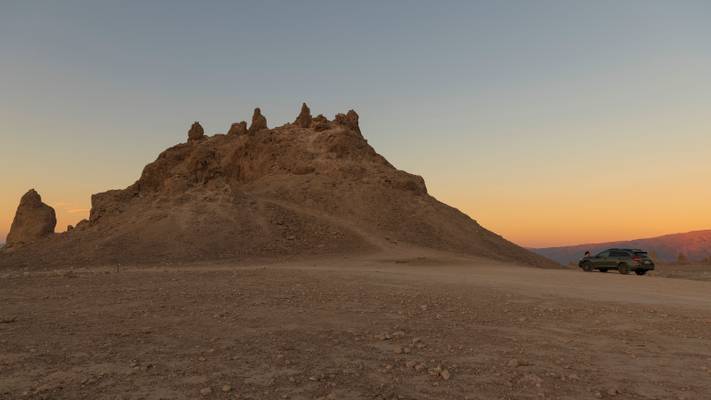
0
- Dalai Lama.
| facebook | 500px | ferpectshotz |
Only after living in Los Angeles for about 2 years did we learned about the wonderful landscape of Trona Pinnacles. It took another couple of years for us to do a trip and visit this stunning and desolate location. Its quite a bit of a drive through the desert to get to the cluster of pinnacles with some interesting geological history. For starters, these pinnacle formations are only formed under water and were formed while the area was a vast prehistoric lake known as Searles Lake. It's hard to imagine today that there was any water here at any time but these amazing tufa pinnacles, that reach up to 145 ft in height, formed when underwater springs released calcium saturated water within a lake or an inland sea. The reaction between spring water and alkaline lake water caused the formation of the pinnacles at Trona.
We reached just as the sunset was about to start so we didn’t have much time to explore the myriad of paths that lead in between the pinnacles. But thankfully found some interesting spots to shoot the pinnacles. Here is a shot I made using our car for scale just to give an idea about how massive some of them are and how large that ancient lake would have to be.
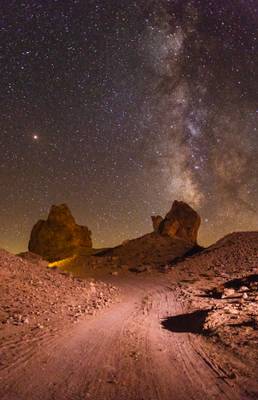
0
- Josh Billings.
| facebook | 500px | ferpectshotz |
To add on the learning aspect, this was my first experimentation with the low-level lighting techniques. This technique is used for a natural looking foreground lighting in Astro-landscape images. I read about this couple of days before and while reading realized that I have all the tools necessary to pull this off. All the technique requires are a couple of small lighting sources and some diffusing material and a great spot with low light pollution.
I had a couple of small USB lanterns that were tiny, and access to a great spot in southern California called the Trona Pinnacles. I used a bunch of white paper towels to diffuse the light. As I started to take photos, I learned that even those tiny lanterns were producing too much light in the ultra-low light environment. I also realized that distance is better at getting the diffused natural looking light than the diffusion material. My pictures turned out much better after I had a couple of passes at it.